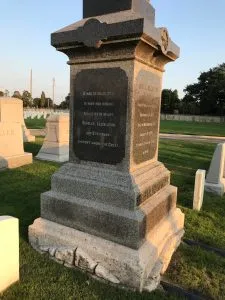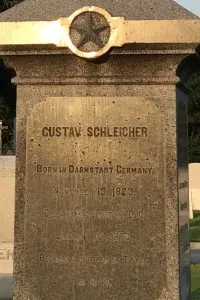
A few months ago, my family and I made a visit to the United States National Cemetery in San Antonio, out near Fort Sam Houston. For those that are history enthusiasts, this can be a wonderful way to indulge that passion, by visiting the graves of those that made history. Although I could go on about the many interesting features and residents of that graveyard, one grave in particular stood out to me, that of Gustav Schleicher.
His epitaph read like many do, in grandiose praise for the gentleman that was. “A man of great gifts of mind and winning qualities of heart. Scholar, legislator, and stateman – eminent among the great.” Certainly, there is truth to this. Quickly glancing through what the Texas State Historical Association has to say about him, he had unquestionably acquired greatness in his time.
Arriving in Texas in 1847, Schleicher was a beneficiary of the Texas Republic’s Fisher-Miller land grant, were he participated in the Bettina communal experiment. He soon became “disillusioned” with the communal life’s hypocrisy and went on to pursue engineering ventures, such as a bridge across the Guadalupe River and the creation of the Mexican Gulf Railroad. Additionally, he went on to serve in the Texas House of Representatives, as a Bexar Land District Surveyor, he founded the San Antonio Water Company and Alamo College, became a CS Army Captain, is credited as the modern-founder of the city of Cuero, served as a U.S. Congressman, and had many other distinguishing marks in a very long resume. Even Schleicher county in West Texas is his namesake, so important was he to Texas.
While all these accomplishments were unknow to me at the time, there was one detail that emerged above all others, embossed on the side of Gustav’s obelisk. It read:
Gustav Schleicher
Born in Darmstadt Germany
November 19, 1823
Died in Washington D.C.
January 10, 1879
Became a Citizen of Texas
In 1847

After his birth and death dates, the other date that was thought important enough to note was the year he became a Texas citizen. And while Texas had already been officially accepted as a U.S. State the year previous, Gustav’s original immigration to Texas was done through the old Republic. Presumably, those that loved Gustav thought to note his Texas citizenship as something that distinguished him. Perhaps it was a mark of personal pride for Schleicher, an ally of Sam Houston and supporter of Texas independence.
Everyone has some definition for greatness, a measure they apply to their own lives, either having rose to it or grasped at it. For myself, I hope by the end of my life that I have made a difference for what believe is right, be that greatness or not. However, in my estimation, there are few titles greater that could mark my headstone than that I was a Citizen of the Independent Republic of Texas. And if, by that time, I had also contributed to the legal and peaceful resuscitation of the Republic, so much the better!